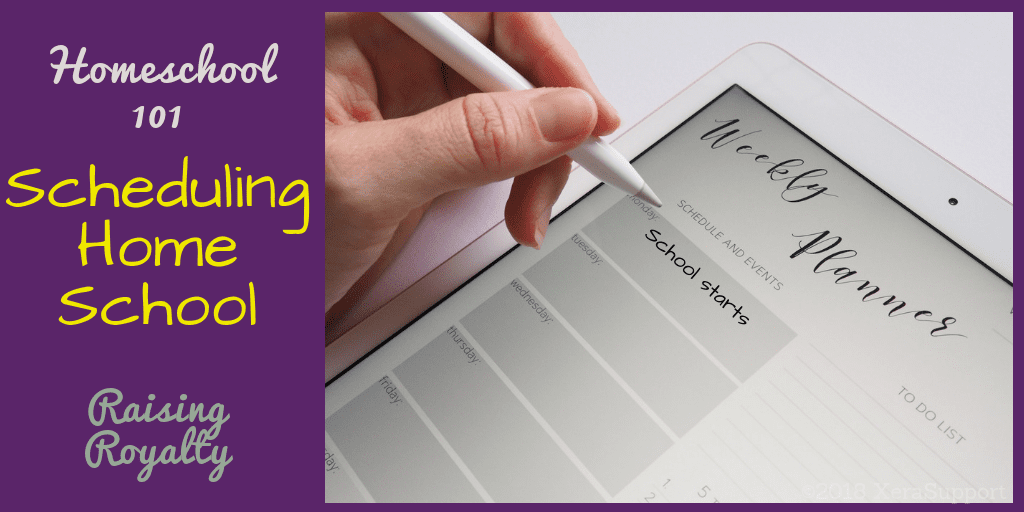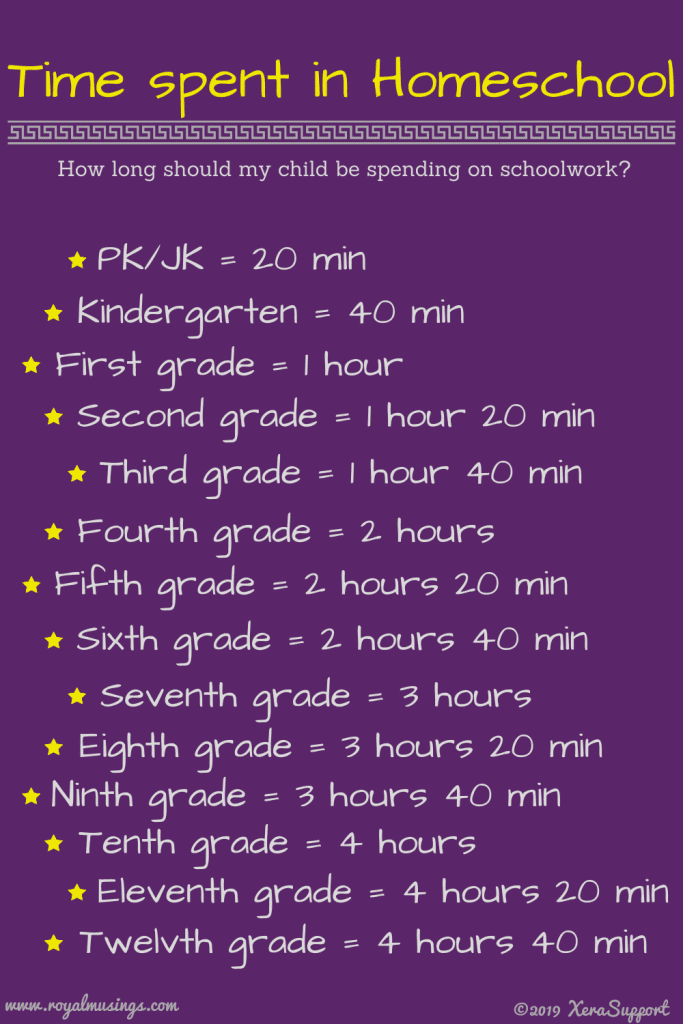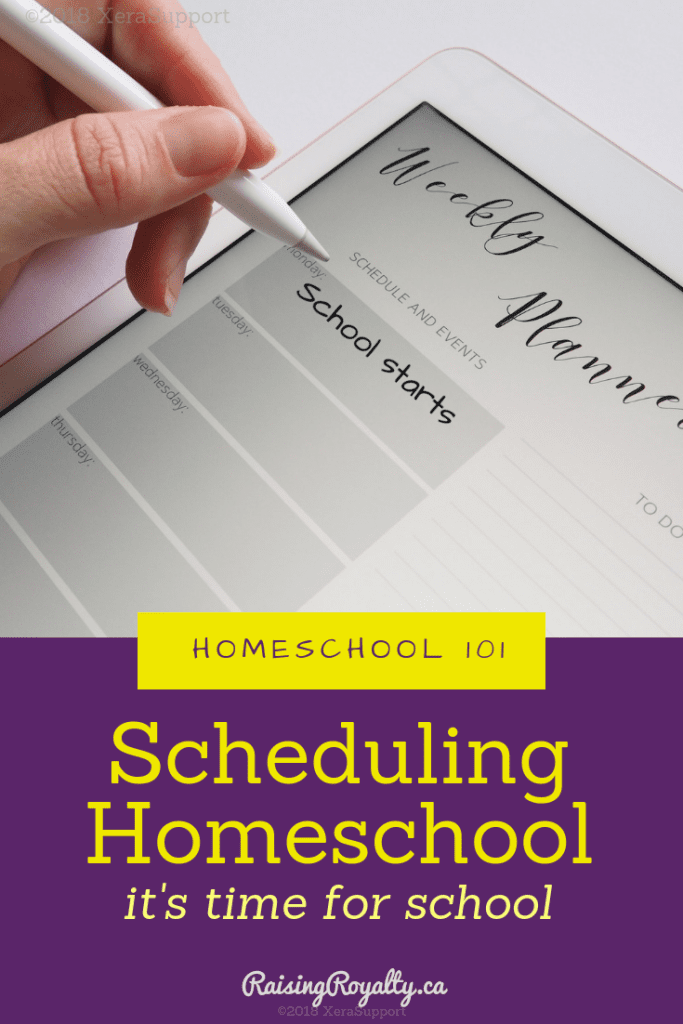

How long do you do “school” every day? How should we be scheduling homeschool? What does a typical day look like? There are so many ways to answer these questions, and there is no one right answer. The beauty of homeschooling is it’s flexibility.
Homeschool Doesn’t Look Like Public School
This is the awesomeness of home schooling. It does NOT need to look like public school.
Many people get confused with this. If it doesn’t look like public school, how do you know they’re learning? And if they aren’t spending 6+ hours a day doing school, how will they learn everything they need to know?
Some would say that homeschoolers should follow a public school timetable, both daily and throughout their year. Others would say that there’s no time when their children stop learning, so counting the hours of education is pointless.
Consider this: a large part of a child’s day in public school is spent in waiting. They wait in line to go in to class, to go out to recess, to go to music class or art class or to lunch, or even to the bathroom! They wait for papers to be handed out, for instructions to be given, for supplies to be provided. Students must wait for teachers to give them attention. And they have to wait for other students to behave before a lot of those other things they’re waiting on can happen!
Most of that doesn’t happen at home. Kids at home can use the bathroom whenever they like. They don’t have to wait in line to go outside or to go to class. And while they might have to wait for supplies or instructions, it won’t be nearly as long as in school.
Because homeschool looks different than public school, scheduling homeschool probably isn’t going to be the same either.
What are the homeschool scheduling questions?
Common scheduling homeschool questions for new homeschoolers are:
- how long do you school every day?
- do I have to follow the public school calendar?
- how long should I spend on spelling/math/science/whatever?
- how many days a week do I do history/grammar/spanish/whatever?
- what if I have to report a certain amount of instructional hours?
- how do I know they’re learning if we aren’t spending hours in textbooks??
So how do you answer the common questions about schedules?
We fit homeschool in and around our lives and activities.
We all know learning can happen everywhere, and it doesn’t always mean reading a textbook or answering questions in a workbook. Many people have a philosophy of no formal academics at all, unless the child requests it.
Videos and video games are excellent learning tools. Going outside and observing nature, experimenting in the bath tub, and baking cookies with mom are also immensely educational. A trip to the bank or the gas station is rich with learning opportunities. And there’s nothing wrong with a child sitting and daydreaming!
But even if you do choose to use some combination of workbooks or textbooks or lessons, you can still experience the flexibility of homeschooling.
You can help your son with his science experiment while you’re making dinner. You can drill your daughter’s spelling list on the way to the grocery store. Or work on math problems while you’re waiting at the doctor’s office.
School happens.. whenever, wherever and however you need it to.
Whether you spend 2 hours on math one day, and whip through all your planned subjects in 3 hours the next, it’s all normal. Why should a child have to sit and work in workbooks for 4 hours, when they finish the assignment in 15 minutes? Scheduling homeschool shouldn’t mean punishing a child for being a good student.
I know one mom who is a dance teacher, and her own children will do their school work in another room, while she’s teaching. They can be done all 5 core subjects (math, spelling, grammar, penmanship and writing) in two hours. Have they learned less simply because they’re good students and work diligently?
My oldest did math, reading, writing, and Bible study on a 1 hour trip to my 2nd’s specialists’ appointments. My middle kids brought their school work with us to my chiropractor’s appointment.
One of the best things about homeschooling is the flexibility.
Artificial separation?
There seems to be this need for an artificial separation between home and work and school. “School” has to look one way, and home is something different.
But parenting, homeschooling and life don’t have to be separated. They can be sweetly blended together. As a mom, I can correct attitude issues in my children while I’m teaching them a new math concept. Some of our best learning has happened while eating breakfast together. And I work from home, meaning that my kids can learn about entrepreneurship and technology while I earn an income too!
We are a family, and everything — work, parenting, cleaning, homeschooling — everything happens together.
Because life = homeschooling, parenting, work, cleaning up, everything, is done all together, there’s so much I could count as “school”. The formal seat work we do is just one small aspect of our homeschool.
There’s so much more that can be counted. Thankfully I’m not in a jurisdiction that requires reporting, but if I were, I wouldn’t worry at all about reporting hours. We easily spend all day in learning activities.


Answering the scheduling homeschool questions
So do you spend 2 hours on a math lesson? If that’s what it takes to learn it the concept (and if your student is simply being a rebellious kid, it becomes a parenting moment more than a school moment).
Do you alternate history and science and geography? Sure.
Or you can do them all at once. Or back-to-back.
You can schedule homeschool however it suits your family.
You can spend 6+ hours on “school” if that’s what is best for your family. Or you can spend all your hours learning organically if that’s a better fit. And you can do a combination of both!
A Look at One Homeschool Schedule
Here’s what our tentative school schedule looks like, for your convenience:
- We school year round, January to December.
- We take a 3-6 week break approximately every 3 months. These big breaks usually coincide with Christmas, Easter and a summer break around mid July/August.
- We take a 1 week break approximately every 6 weeks. These little breaks usually coincide with our Canadian Thanksgiving (October), Valentine’s Day, and one long weekend in May/June-ish.
- We school 4 days a week, fitting in as necessary on the 5th day anything extra.
- We have no set time for school, as the list of assigned lessons is posted along with their chores, and as long as the list is completed by the end of the week, I’m fine with it. I help as wanted, direct as needed, and remind frequently.
- School work sometimes gets done before breakfast, sometimes after supper, sometimes in the car and sometimes at the kitchen table. While we have one place where all the books and craft supplies and extra paper and pencils are kept, it’s rare that school work actually happens there.
How long should school take every day?
Typically, a good rule of thumb is that formal seat work should amount to +20 min per grade level. Formal seat work is the work that is done in a workbook, textbook or on computer, that requires a child to sit still and read, write or solve set problems. This is also known as “formal academics”.
You can start with 20 minutes of book work in preschool — 5 minutes spent on coloring, 5 minutes spent reading a story, 5 minutes spent in tracing numbers, letters or their name, and 5 minutes of flashcards or other game. And all those activities don’t have to happen all in a row, back-to-back.


By the time you get to 4th grade, your student will probably have approximately 2 hours of seat work to do. A middle school child will have around 3 hours, and high school will take between 4-6 hours. And of course, every child and family is different, so your unique experience will vary.
Here’s a handy chart to use as a guideline.


It’s completely under your control
Homeschooling schedules and timing are completely under your control. You can decide when to start, when to end, and what your day looks like. And nothing is set in stone! You can change your schedule whenever you like, to suit your family.
When your student doesn’t have to wait, the school work doesn’t actually take that long. Just think of the freedom you have when you don’t have to spend hours and hours in one place waiting!
Your children will thank you for the free time to play, create, move, and grow.


What does your day look like? How long does your family spend homeschooling?



Homeschooling at our house begins with rosary at 7am, oral lessons immediately following (all of MY duties as teacher), then breakfast. Now the kids are ready to tackle their schooling whether I can be home or not that morning. Of course, I’m still available to help when they’re stuck. And they’re always done before lunch. This is our schedule most days, but it is flexible when needed. Dad works shift work, so homeschooling means he gets to see the kids no matter what time he’s off. We do this year in and year out, and now that I am finished child bearing, we follow the same rhythms as the public school system – same holidays. We used to work our school around a new baby every year. Eleven times. The blessings of homeschooling. God is good! Thanks for sharing. I love your blog!
Wow! I love hearing how different families homeschool. And I hear you on scheduling school around the babies 🙂 I’ve done the same! Thanks for reading.
Our state (New York) requires X amount of minutes per school year. For K- grade 8 it’s 900 hours per year. We normally go for 5 hours a day for 180 days. Our boys are in grade 1 this year so it’s only our second year. We are loving it!
Whatever works for you 🙂 Homeschooling can be so flexible!
Hey im from newyork too. This is my first year doing homeschool. I find myself looking at everybody’s homeschooling routine. Not sure what to do. I try to make it like school but then again i took him out because I didnt like the way its being run. So now im stuck. I do time4learning, which he loves but i also have open books and work sheets just to make sure he understands. I think i would be less worry if i didnt have to report to the BOE. I do enjoy homeschool and seeing his progress for myself.
I recently wrote about this issue on my blog. There’s a lot of dead time in the classroom, especially since the public school day is intended to coincide with the adult work day.
We homeschool year-round. Right now, we are in OK, which has no regulations on homeschooling. We use to live in KS, which has an hour requirement. Averaging those hours out over the course of the calendar year (as opposed to the school year) worked out to about 3 hours per day, and one of those is covered by a daily documentary plus discussion time. Those state hourly requirements also include PE.
https://trialanderrorhomeec.blogspot.com/2019/02/school-days.html
That’s the whole point of this. Many new-to-homeschooling families come to homeschooling with the idea that they have to fill up 6+ hours with formal academic instruction, and it’s not necessarily true.
There’s an ad that plays occasionally locally, and it’s a cute poem. The last phrase is, “learning can happen anywhere, all it takes is a book.” While, it might not need a book, but learning can and does happen anywhere. And it doesn’t have to look like “school”!!
Isn’t that awesome?!
Great post! I could have written it myself. I love how flexible homeschooling is. Our schooling looks different every day, but the lack of rigidity is what makes us thrive. Thanks for writing!
That’s the beauty of homeschooling! The flexibility makes it possible for any family to homeschool, and there’s no one right way.
my son sets his own schedule.. with my general overview and likes to set it up the same way all the time. Trying to switch it up a bit is difficult for him. 🙂
Whatever works for you and your kids! The ability to choose your own schedule is a fantastic part of homeschooling!
I loved this post as it was so relatable! I have a background in elementary education and it is so true that so much time wasted on waiting. Now I homeschool my three daughters (grades K-5th) and they know that once their work is finished, they are finished for the day. Sometimes it takes an hour. Other times it takes four. It all depends on how engaged they are in the topic we are studying and how quickly they finished their math and prayer journals. I believe that kids should learn to work hard but should be able to enjoy their time as a child and play! They constantly surprise me by what they learn during exploration of the world around them + free play. It’s how education should be IMO. Thank you for posting this! It was the chart on Pinterest which drew me to this post. 🙂
Thank you! Yes my chart pin seems to be controversial, but when you read the post, you’ll see I’m not advocating that all learning will take place in just a couple of hours — just formal seat work. Learning can happen anytime, and getting out of that idea that learning has to be with desks and textbooks is so freeing! I honestly think my kids learn more with their free exploration than they do in the books anyway.
Thanks so much for reading. And please share!
Thank you, this really helped me. I am a new Homeschooling Mum and I often wonder if we are ‘doing enough’…reading through these comments gives me assurance that we ARE doing enough. Love your blog. xx
And it’s for people like you that I write! Anyone can homeschool if they want to. There’s no one right way. I just hope to encourage anyone that is wanting to start or continue homeschooling. Thank you so much for reading!
Thank you for your post. I am new to homeschooling my 4 year old. I work from home so my struggle is keeping him entertained while I work.
I’m so glad you found it helpful! You might find my post on How to Do Anything with Small Children useful too. You can check it out here: https://raisingroyalty.ca/things-to-do-with-kids-at-home/
In our state we have to homeschool the kids the same amount of days and hours as regular public schools. Also we have to give our children all the sol tests and take the results to the school so they have them on file.
That’s common in a lot of places. Fortunately, what counts as school doesn’t have to mean formal academic seatwork! You can still accomplish all the necessary hours without spending all those hours doing workbook-textbook type learning. Lots of things can count as educational, from watching a history documentary to playing football in the backyard. I recommend checking out my post on “Educationalese” to see how easy it is to translate every day activities into the educational jargon that ticks all the boxes for the school officials.
I am an administrator at a Montessori School in Nashville. I would love to share your image and information regarding time suggestions for school work as they navigate this crisis and work with their children are home. May I have your permission?
You have my permission as long as you also post the link as the source of the info please 🙂
You spelled twelfth wrong.
My son is autistic and for the last 3 years we’ve done an online virtual schooling program. It seems like the best choice for him.
Yup. I mixed up two different versions of spelling. Unfortunately, that was almost 5 years ago, and the pin has gone viral, and I can’t fix it, no matter how many times I try to upload a new version. Oh well!
So glad you found something that works for your son! One of the best things about homeschooling is the freedom to choose materials and programs that work, instead of being forced into one specific way of education.